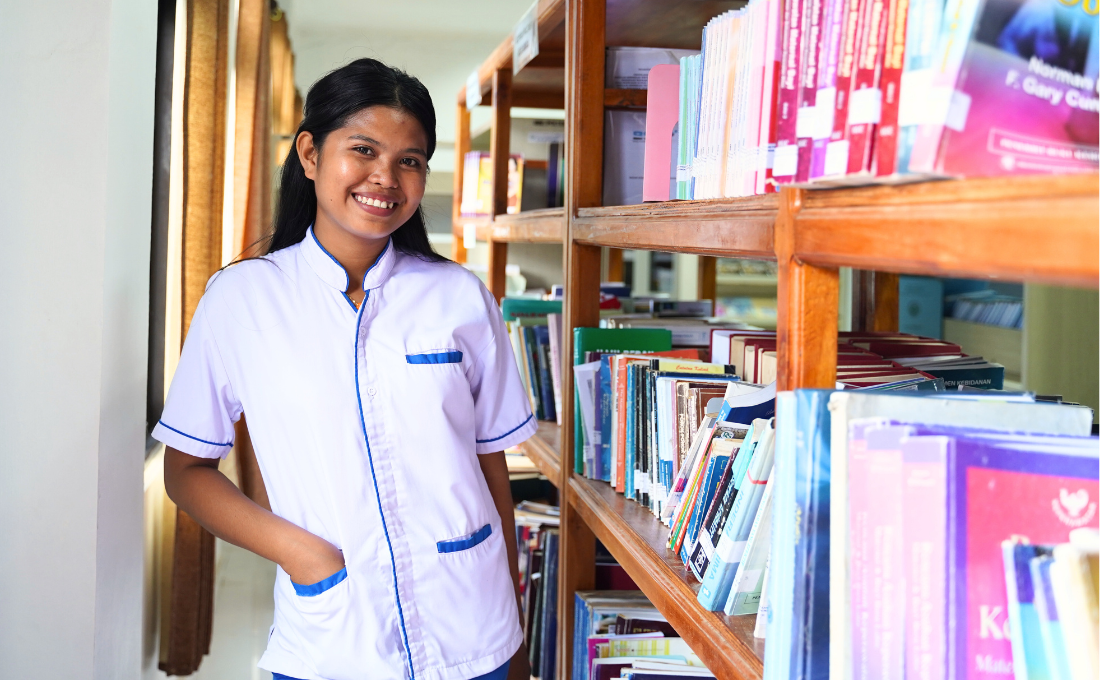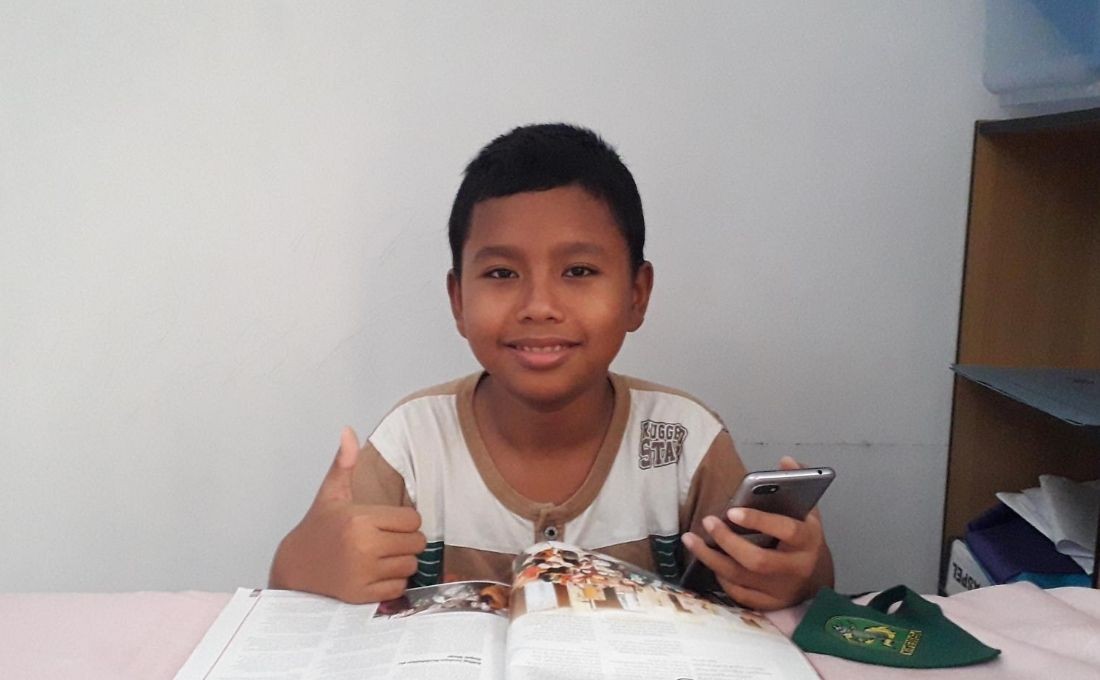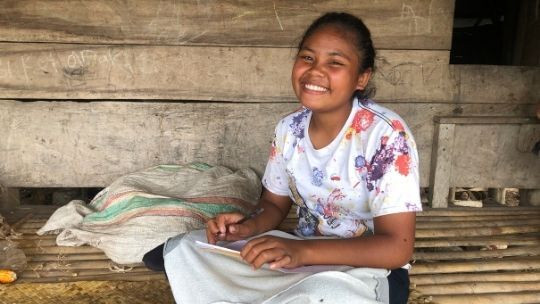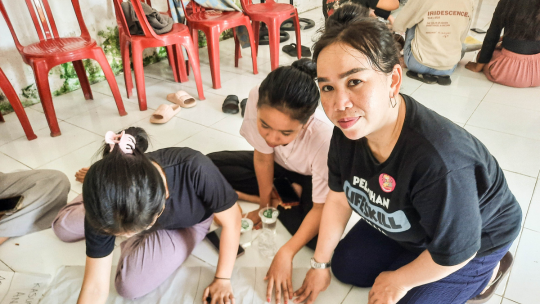Desiani Brave Enough to Dream Higher

Poverty isn't just about economics. Its cruelest side is how it continuously robs people of the courage to hope for a better life. Poverty carves a sense of shame, helplessness, and inadequacy into a person's heart. If that person is a child, poverty can break the hope of an entire generation.
Poverty alleviation should always be a top priority for stakeholders. The impact of poverty is broad and deep, yet efforts to alleviate it often only treat what's on the surface. How a child's self-image can change from poor to empowered is often overlooked or considered too difficult to tackle.
Therefore, this effort can't rely solely on external parties willing to offer aid or facilities. It must, first and foremost, start with the children and the community themselves. In poverty alleviation, the main actors aren't donors, philanthropists, corporations, or the government, but all members of that society. External parties are merely supporting actors who are committed to always being there when the children and the community face obstacles.
Poverty cannot be overcome through charity alone, as it's been proven not to guarantee that community members won't be trapped in poverty again. In contrast, transformative community development can be a starting point for poverty alleviation. Children and communities need assistance, in addition to aid. The process takes time and effort, but when a child or adult becomes empowered, the impact will sustain and even multiply.
Desiani, a student at a health polytechnic in Kupang, East Nusa Tenggara, is a living example of how she was able to escape poverty by changing her self-image. "Actually, there's a talent within us, but we're not brave enough to act and express it because we're not used to doing so. We rarely feel capable. Actually, even if we don't know, it's okay to still move forward. The truth is, we can dream higher without fear," she says.
This young woman was born and raised in East Sumba Regency. Both her parents are farmers with no fixed income. The cost of her education depended on how many of her parents' betel leaves, areca nuts, or pigs were sold. Desiani recounts, "Our environment was very limited. There was no clean water source, no electricity, no network. We had to dig a spring near the river to fetch water. I had to walk to school. It was far, about five kilometres."
If viewed through an economic lens, the solution for Desiani to escape poverty would be to provide water, electricity, and internet, or to give her parents cash assistance. After the aid is given, the only thing that changes is a new monument in the village: clean water pipes, electricity poles, and an internet tower. The cash aid to Desiani's parents might not even go towards the right needs. This economic lens needs to be supplemented with a community development lens so it doesn't just address what is visible. With this lens, the way out of poverty begins with mentoring and the realisation that living in a poor environment doesn't mean you're without potential.
The limitations Desiani mentioned were compounded by a lack of awareness and knowledge among parents about children's rights. "When I was a child, parents of the kids around me would forbid their children from participating in school or church activities. The reasons were that there was no one to take the horses to the mountain, no one to cut grass for livestock feed, no one to help with cooking. If parents saw their children playing, they would surely hit them. 'You have to go to work, go fetch water, you're not allowed to play'," Desiani revealed.
Due to their lack of awareness and knowledge on children's rights, adults unconsciously created an environment that further diminished children's dreams of becoming empowered. Their aspirations felt distant because they couldn't even play. When they spoke to their parents, they weren't listened to. "Why is there a sense of shame in our community? Because children aren't allowed to speak when adults are talking. Children have to be in the back, not allowed to join in. They're not allowed to voice their opinions. So the children felt, 'What's the point of us talking, we're not valued anyway'," she added.
Now, confidently and firmly, Desiani can talk about her childhood. She was once that shy child from the village. Her transformation didn't happen suddenly or on its own; it was accompanied by the presence of Wahana Visi Indonesia (WVI), the guidance of staff at the time, and the support of small gifts from her sponsor. From grade 2 until she was a teenager, Desiani was a WVI sponsored child. Her village was assisted for over a decade.
Desiani's self-image changed along with her community. Parents who once didn't understand how a child should live, came to understand. Children who were afraid and shy, grew to be more active and confident. WVI was there to introduce the idea that children can be recognised, heard, and valued through simple activities. "At that time, we had many activities like speech contests, National Children's Day celebrations, leadership training, and competitions. The prizes from the competitions or activities were soap or toothbrushes. Those were a huge help because in the village, they were rarely sold, or we didn't have the money to buy them. What would you choose, money for food or a toothbrush?" she said.
The big goal of these activities was to set the spotlight on the children. Children were encouraged to realise that potential always exists within them, to find out their individual potentials, and then to make a plan to develop them. The adults in the village saw how WVI celebrated the children's existence, so their self-image as helpless and poor human beings was eroded. The children became a reminder to the parents that hope had always been there and could be realised.
"I had a dream of becoming a nurse since primary school. I almost didn't want to continue to university because I saw my parents' financial situation. But I was inspired by the WVI staff, that I had to go to university. To make my dream of becoming a nurse a reality. Now I'm the first child in my family to go to university. My younger siblings have to go to university too. I remember the WVI staff always pushing me to keep moving forward until I was no longer afraid to dream," Desiani said.
Today, as Desiani successfully becomes a university student, overcoming all obstacles, to her parents, she is a source of pride. Their shy daughter, who grew up in an unsupportive environment, has now become an empowered young woman who dares to dream. For WVI, Desiani is a great person whose transformation has become a chain-breaker of poverty, an inspiration for other children in her village.
"For me, WVI is an organisation that can make children from Sumba dream higher, without any fear," she expressed. She proves her courage to keep dreaming with a series of future plans. She wants to finish her education and become a patient nurse, serving others as she would her own parents. In addition, she also wants to fund her younger siblings' education to university level. Her goal is no longer just about achieving certain target, but about becoming a better figure, an empowered woman.
"So that my siblings and I can become independent adult women. When we're married, we'll have our own income. In Sumba, most men are the breadwinners, and their wives stay at home and are seen as a burden. So if my siblings and I finish university and have our own income, we can help out in our own households," she concluded.
Author: Mariana Kurniawati (Communication Executive)



